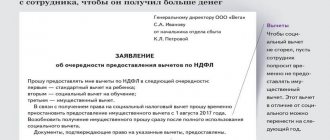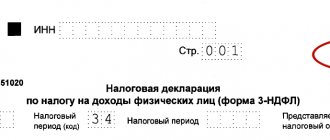Standard tax deduction is a reduction in the personal income tax withheld by a legal entity. The procedure for forming the tax base and the official conditions for receiving financial assistance from the state are established by law (Article 218 of the Tax Code of the Russian Federation). People who have the right to use the benefit include citizens providing for their own or adopted children. Among them:
- trustees,
- parents,
- adoptive parents,
- guardians.
A tax deduction of 1,400 rubles is provided by the state when people have their first children. The 3rd child and subsequent ones give the right to a more significant reduction in the calculation base for calculating personal income tax (3,000 rubles). The benefit remains until adulthood or 24 years of age, when completing full-time education. According to the current law, a disabled child of group I or II gives trustees or guardians a reason to receive financial assistance in the form of a tax deduction in the amount of 6,000 rubles. When he is supported by his parents or adoptive parents, the benefit increases to 12,000.
What is a tax deduction?
If a citizen has worked or is working and pays taxes to the state, he has the opportunity to return part of the money to his home budget or not pay taxes at all (part of the amount) for a certain period of time. To do this, you need to get a so-called tax deduction, that is, reduce your taxable income.
READ ON THE TOPIC:
Tax questions and answers: what is a declaration, personal income tax, tax deductions
A tax deduction
is an amount that reduces the amount of income on which tax is levied. Often the income you receive is only 87% of what you earned. Because your employer (or other tax agent) pays 13 rubles out of every 100 rubles for you as tax (personal income tax, otherwise called income tax). In some cases, you can get this money back. One type of deduction is the standard tax deduction.
What are standard tax deductions?
“Standard deductions” or “standard tax deductions” is simply a term used in the laws for certain types of deductions. This does not mean that other deductions (other types of deductions) are somehow non-standard (unique).
Standard tax deductions
can be divided into two groups - deductions for certain groups of people and deductions that are sometimes available to those who have children.
- The first group of deductions is for disabled people, heroes of Russia, and so on.
- The second group of deductions is for those who have children (or one child) and whose income is less than a certain amount. The second group of deductions is described in more detail below.
One of the standard tax deductions is the child tax deduction. It is provided to parents, adoptive parents, guardians and other persons raising children. The full list of persons who may qualify for a standard tax deduction is specified in Article 218 of the Tax Code of the Russian Federation.
Let us immediately note that the standard tax deduction for children in 2016 is provided regardless of the provision of other deductions.
Who is entitled to receive this deduction?
According to the law, the following categories of citizens have the right to this:
- parents and their spouses;
- adoptive parents;
- guardians and trustees.
It is important to highlight the following points:
- Tax relief cannot be received by those people who do not have income subject to personal income tax. We are talking about individual entrepreneurs (individual entrepreneurs) working under a special tax regime (not the standard 13% personal income tax) and individuals (citizens) whose only income is unemployment benefits.
- If one of the spouses has a child from a previous marriage for whom alimony is paid, then the new child in the current marriage will be considered the second (and so on).
- If the current marriage is not officially registered, the second parent is able to receive a deduction by providing evidence that he is providing for the adopted child: an agreement on the payment of alimony (certified by a notary) or a court decision indicating the child’s registration details (do they coincide with the parent’s place of residence) .
- In some cases, it is possible to receive a double tax deduction:
if the parent is considered the only one. To confirm the fact that the second parent is absent, it is necessary to provide a certificate of his death or a court decision recognizing him as missing. A single parent can have a double SNA until they remarry;- if one of the parents voluntarily refused his deduction. The latter can be done if this parent submits a self-completed application to waive the child tax benefit and transfer this right to the second parent.
In fact, it is not easy for a person to issue a double tax deduction, since this issue is not described in detail in the law. However, the opportunity to do this exists.
Providing a tax credit for children in 2021
READ ON THE TOPIC:
The amount of child benefits and maternity benefits in 2021.
Indexation and calculation of payments The deduction for children in 2015 is provided until the month in which the taxpayer’s income, taxed at a rate of 13% and calculated on an accrual basis from the beginning of the year, exceeded 280 thousand rubles. The deduction is canceled from the month when the employee’s income exceeds this amount.
- for the first and second child – 1400 rubles
; - for the third and each subsequent child - 3,000 rubles
; - for each disabled child under 18 years of age, or a full-time student, graduate student, resident, intern, student under the age of 24, if he is a disabled person of group I or II - 3,000 rubles
.
If spouses, in addition to a common child, have a child from an early marriage, the common child is considered the third.
Let us remind you that the Government of the Russian Federation has already approved a bill according to which the threshold amount for receiving a deduction is increased from January 1, 2021 from 280 to 350 thousand rubles.
In addition, the same project proposes to increase from 2021 the standard deduction for each disabled child to parents and adoptive parents who support the child from 3,000 to 12,000 rubles. And for guardians, trustees and adoptive parents - from 3,000 to 6,000 rubles.
All changes come into effect on January 1, 2021.
Social deductions for personal income tax 2021.
According to the rules of paragraph 1 of Art. 219 of the Tax Code of the Russian Federation when determining the size of the tax base in accordance with paragraph 3 of Art. 210 of the Tax Code of the Russian Federation, the taxpayer has the right to receive the following social tax deductions for personal income tax in 2016:
- in the amount of income transferred by the taxpayer in the form of donations (clause 1);
- in the amount paid by the taxpayer in the tax period for his education in educational institutions, as well as in the amount paid by the taxpayer-parent for the education of his children under the age of 24, by the taxpayer-guardian (taxpayer-trustee) for the education of his wards under the age of 18 years of full-time study in educational institutions (paragraph 2);
- in the amount paid by the taxpayer in the tax period for medical services provided by medical organizations, individual entrepreneurs engaged in medical activities, to him, his spouse, parents, children (including adopted ones) under the age of 18, wards under the age of 18 years of age, as well as in the amount of the cost of medications for medical use prescribed by the attending physician and purchased by the taxpayer at his own expense (clause 3);
- in the amount of pension contributions paid by the taxpayer in the tax period under the agreement (agreements) of non-state pension provision concluded by the taxpayer with the non-state pension fund (clause 4);
- in the amount of additional insurance contributions paid by the taxpayer during the tax period for the funded part of the labor pension in accordance with Federal Law No. 56-FZ of April 30, 2008 “On additional insurance contributions for the funded pension and state support for the formation of pension savings” (clause 5).
For your information
The total amount of social tax deductions for personal income tax in 2021, provided for in paragraphs. 2 – 5 p. 1 tbsp. 219 of the Tax Code of the Russian Federation (excluding expenses for education of children (wards) and expenses for expensive treatment) should not exceed 120,000 rubles. in the tax period. In this case, the taxpayer independently selects the types of expenses that he will claim for tax deduction (Letter of the Ministry of Finance of the Russian Federation dated May 31, 2011 No. 03‑04‑05/7-388).
The procedure for obtaining the standard tax deduction for children in 2016
To receive a deduction for children, you must do the following.
- Write an application for a standard tax deduction for a child (children) addressed to the employer.
- Prepare copies of documents confirming the right to receive a deduction for the child (children):
- If the employee is the only parent (the only adoptive parent), it is necessary to supplement the set of documents with a copy of the document certifying that the parent is the only one.
- If the employee is a guardian or trustee, it is necessary to supplement the set of documents with a copy of the document on guardianship or trusteeship of the child.
- Contact the employer with an application for a standard tax deduction for the child (children) and copies of documents confirming the right to such a deduction.
To correctly determine the amount of the deduction, it is necessary to line up the children according to their dates of birth. The first born child is the oldest child, regardless of whether a deduction is provided for him or not.
If a taxpayer works for several employers at the same time, the deduction at his choice can be provided only with one employer.
“Children’s” deductions if a child starts his own family
Since in some cases the deduction is also given to an adult child (over 24 years old), a situation is likely when he starts his own family. Is the parent still entitled to the standard deduction? Officials from different departments give different answers to this question.
For example, in the letter of the Federal Tax Service of the Russian Federation for Moscow dated June 6, 2014 No. 20-15/055333, it is stated that a deduction for a child is provided regardless of the fact of the child’s marriage.
In letters of the Ministry of Finance of the Russian Federation dated March 29, 2019 No. 03-04-05/21857, dated March 17, 2016 No. 03-04-05/14853, dated March 31, 2014 No. 03-04-06/14217, the exact opposite position is given: after the child joins (including a student) a new family is formed by marriage, so he ceases to be supported by his parents, therefore, the taxpayer is not provided with a standard deduction for a child.
The position of the capital's Federal Tax Service seems to us more correct. In Art. 218 of the Tax Code of the Russian Federation there are no rules that prohibit giving a deduction if a child gets married. If, even after the marriage is registered, the parents continue to support the child, then the parents retain the right to a deduction. In addition, the employer is not obliged to check whether the employee’s child has started his own family. And an employee-parent is not obliged to inform his employer about the wedding of his son or daughter. Therefore, a joyful event should not interfere with receiving a “children’s” deduction.
When does the deduction stop?
An employee loses the right to a standard deduction upon the occurrence of one of the following events:
- if income exceeds 280,000 (350,000 rubles in 2021) - the deduction stops from the month in which the excess occurred.
- if the child died, the deduction is fully submitted in the current year, but stops from January of the next year.
- if the child has reached the age of 18 this year and is not a full-time student, the deduction is fully submitted in the current year, but stops from January of the next year.
- if the child has completed his studies at an educational institution and has not yet reached 24 years of age, the deduction is fully submitted in the current year, but stops from January of the next year.
- if a child reaches the age of 24, but continues to study (student, graduate student, intern, cadet) - the deduction is fully submitted in the current year, but stops from January of the next year.
- if the child completed training before the age of 24, the employee loses the right to deduction from the next month in which training ceased.
Is it necessary to give a deduction for “non-income” months?
There is no clear answer to the question of whether a “children’s” deduction should be provided for months in which the employee did not have income subject to personal income tax at a rate of 13%. The Russian Ministry of Finance believes that everything depends on whether income has resumed this year. If resumed, then deductions for “non-income” months can be provided. If there is no income until December 31 inclusive, then there will be no deductions this year (letter dated October 30, 2018 No. 03-04-05/78020. See “The employee will have no income until the end of the year: is he entitled to a standard deduction according to personal income tax?").
The Federal Tax Service thinks differently. The letter dated 05.29.15 No. BS-19-11/112 states that deductions for a child for months in which there was no income are due in any case (see “Federal Tax Service: standard tax deductions for children can also be received for those months , during which the individual did not have taxable income"). A similar point of view is set out in the Resolution of the Presidium of the Supreme Arbitration Court of the Russian Federation dated July 14, 2009 No. 4431/09. In our opinion, this approach is correct, and thanks to the court’s position, it is completely safe.
Calculate “complex” salaries with coefficients and bonuses for a large number of employees
Example of calculating the standard child tax credit
Matveeva E.V. four children aged 16, 15, 8 and 5 years.
Moreover, her monthly income (salary) is 40,000 rubles.
Matveeva E.V. submitted a written application to the employer to receive a standard tax deduction for all children: for the maintenance of the first and second child - 1,400 rubles each, the third and fourth - 3,000 rubles per month.
Thus, the total tax deduction amounted to 8,800 rubles per month.
This amount will be deducted from the income of Matveeva E.V. until July inclusive, since it is in this month that taxable income from the beginning of the year will reach the threshold of 280,000 (350 thousand rubles in 2016) rubles.
Every month from January to July the employer will pay his employee Matveeva E.V. Personal income tax from the amount of 31,200 rubles, received from the difference in income taxed at a rate of 13% in the amount of 40,000 rubles and the amount of tax deduction in the amount of 8,800 rubles:
Personal income tax = (40,000 rubles – 8,800 rubles) x 13% = 4,056 rubles.
Thus, in the hands of Matveev E.V. will receive 35,944 rubles.
If Matveeva E.V. did not apply for a deduction and did not receive it, then the employer would calculate personal income tax as follows:
Personal income tax = 40,000 rubles. x 13% = 5,200 rubles, income minus personal income tax would be 34,800 rubles.
Tax benefits for families with disabled children
Disabled child status
The status is assigned to young Russians who have persistent health problems, as a result of which the child cannot move independently, take care of himself, control his behavior, study on an equal basis with other children, and in the future - work.
Conclusions on physiological disorders are given by medical commissions operating in cities at children's clinics. The status is granted up to 18 years of age and is not divided into disability groups. After 18 years of age, if health problems persist, the young person can undergo a medical examination again. Then the medical council will decide which disability group to assign: first, second or third, and for how long. It is impossible to obtain permanent disability status at a young age; it will have to be confirmed regularly - annually or once every two to three years.
What benefits are entitled to a disabled child?
The state provides several types of social support to families.
Cash payments.
Disabled status allows parents to apply for a social pension for their child and receive it monthly. The pension amount is set at the federal level and in 2021 is 12,577 rubles. Every year the pension is indexed and increases slightly. The recalculation is done automatically; there is no need to apply for a bonus after the payment is processed by the Pension Fund.
Other payments are also due:
- a monthly cash payment
that compensates for the costs of health improvement in a sanatorium, travel on public transport and obtaining medications. If you refuse these social services, you can increase the benefit amount by 2,700 rubles; - allowance for a person caring for a disabled child.
If this is one of the parents, the state will pay an additional 5,500 rubles per month for care, if another relative or stranger - 1,200 rubles.
To receive a social pension and benefits, you must submit documents to the Pension Fund office in your city. Pension Fund employees will ask to provide the applicant’s passport, documents confirming relationship with the child, and a disability certificate.
The amount of social support varies in regions. For example, in Moscow, in addition to federal benefits, there are regional ones. Every year, Moscow authorities pay 10,000 rubles, which can be spent on purchasing school uniforms, as well as a small amount to compensate for the rise in food prices for children under three years of age. You can find out what types of social assistance are available in your region at the territorial administration of the Pension Fund and the department of social support for the population.
Medicines and rehabilitation.
If you do not refuse medications or spa treatment, you can receive them from the state. The list of medications needed by the child is determined by the pediatrician. They are prescribed in an individual rehabilitation program and are available on prescription in specialized pharmacies. You can undergo treatment in sanatorium-resort institutions once a year. As long as the child is under 18 years old, the trip is paid for both him and the accompanying person.
The state also allocates money for prosthetics, rehabilitation therapy and the purchase of technical devices that the child needs. This could be a wheelchair, special shoes or a hearing aid.
Providing housing and land.
There is no law at the federal level that would oblige the authorities to provide land plots to families with disabled children. But such measures are in effect in many regions, and land is given to parents both for building a house and for running a dacha farm. You can find out if similar benefits are available in your region by contacting your local social security office.
But officials are obliged to provide apartments to families with disabled children, but not to everyone, but only to those who really need housing. Reasons for providing an apartment:
- lack of housing for a family with a special needs child;
- insufficient apartment area;
- a severe form of a chronic disease in which it is impossible for a family to live in an existing residential building.
Benefits for housing and communal services.
Parents have the right to return 50 percent of housing and utility costs. This benefit applies to the entire amount of utility bills of the family, regardless of the number of people registered in the living space. The benefit is provided in the form of compensation for expenses already incurred, that is, at the beginning of the month, parents need to pay utility bills in full, and within a month half of the amount will be returned to their bank account.
To receive benefits, you need to contact the territorial department of social protection with documents for housing, a passport and a certificate of disability of the child.
Labor benefits for parents.
The employer is obliged to provide parents with 4 additional days off every month. Parents can divide these days among themselves, or just one person can use them. The Labor Code also enshrines the right to a shortened working day for both parents, but with payment for the time actually worked. There is a right to 14 days of unpaid leave, which a parent can use at any time, regardless of the vacation schedule.
According to the law, one of the parents can retire early - 5 years earlier if they have sufficient work experience: 15 years for women and 20 years for men. If one of the parents is unable to work because he is forced to care for a disabled child, he can write an application to the Pension Fund with a request to count this period into his work experience. They have no right to refuse him.
Tax benefits for a disabled child
Tax legislation also provides a number of benefits for families with disabled children:
- the right to receive a tax deduction,
- exemption from property tax,
- partial payment of land tax,
- exemption from transport tax.
Some benefits are provided to parents of disabled children at the federal level, in particular, for property tax and tax deduction for a disabled child. Others are only in the regions. To find out if there are tax benefits for parents of disabled children in your region, use the Federal Tax Service website.
Below we will describe each type of tax support in detail.
Standard tax deduction for a disabled child
Both parents have the right to receive it. They issue a deduction at work, but only if the parents work officially, on the basis of an employment contract, and pay 13 percent of personal income tax to the budget from their salary.
The law establishes the amount from which the tax deduction is calculated. It is due to all families with children, and the amount is determined by their number:
- for the first and second children, a deduction of 1,400 rubles is calculated;
- for the third and subsequent ones - from the amount of 3,000 rubles.
Not the entire amount is added to the salary, but only 13 percent of it. This means that the amount of tax deduction per month for the first and second child will be 182 rubles, and if there are three children - already 754 rubles. When submitting an application to the accounting department, this amount will not be deducted from the salary until the parent’s salary for the year exceeds 350 thousand rubles.
The deduction for a disabled child in 2021 is higher than the standard and is calculated from an amount of 12 thousand rubles if the child is raised by his own parents, and 6 thousand rubles if the child grows up in a family of guardians.
To this amount is added the amount for the child's turn. For example, there are two older minor children in a family, and the third child was born with a disability. Parents can apply for a deduction from the calculation:
- 12 thousand rubles for disability,
- 3 thousand rubles for the priority of a disabled child,
- 1400 rubles for the first children.
The deduction amount will be 13 percent of 17,800 rubles, or 2,314 rubles. Both parents or only one, but in double amount, can receive the standard deduction for a disabled child. If the payment is made by only the mother, the accounting department will have to provide a monthly certificate of the father’s salary from his place of work.
The right remains until the disabled child reaches adulthood. If he is the youngest in the family, and the elders have already reached adulthood, the order does not change. You can use the right to deduction even after reaching adulthood, up to 24 years of age. After 18 years of age, this benefit remains under two conditions:
- the young person must undergo a medical examination again and receive disability status again, indicating the group;
- he must study full-time at a technical school, college or university.
The deduction amount does not change until age 24.
Application for a tax deduction for a disabled child
To take advantage of the tax benefit, you need to write an application to your employer. Attach copies of:
- birth certificates of all children,
- certificates of disability.
When passing the medical examination again, the certificate must be provided to the employer again. After reaching the age of majority, you must bring a certificate of disability indicating the group, as well as a document from the technical school or institute where the child is studying.
If the payment is made by one of the parents, the other must write an application refusing to receive a tax deduction at the place of work.
To write a statement, use this form.
If you apply for a personal income tax deduction for a disabled child at your main place of work, it does not matter what month you do it. You can submit documents in the fall, and your money should be refunded in January. If you change your place of work, you need to bring a certificate from your previous place of work to the company’s accounting department, and based on these documents, the new employer must issue a deduction.
Receiving deductions for previous years
A personal income tax deduction for a disabled child can be issued not only for the current year, but also for previous ones. The state returns part of the taxes for the previous three years. It is impossible to receive money for last year from the employer, but you can apply to the tax office.
Write an application using the form and attach to it a declaration for the year for which the deduction is issued. You can submit an application in person or through the online account on the Federal Tax Service website. The application will be considered for three months. If the documents are filled out correctly, within a month the amount will be transferred to the account you specified. If you indicated something incorrectly, a specialist from the tax office will call you and ask you to provide the missing document or correct the error when filling it out.
Property tax benefits
According to the law, every person who receives a pension has the right to tax benefits, and it does not matter whether the payment is due to age or health status. Disabled children are exempt from paying property taxes, but their parents are not. If a child has a share of ownership of the apartment, the tax amount will be reduced by this part.
The same applies to paying land taxes. If the plot is registered in the name of a disabled child, you do not need to pay tax, but not for all the land, but only for 6 acres. If the plot is larger, you will have to pay for the difference between its area and the non-taxable minimum. For example, the tax for a plot of 10 acres will be calculated from 4 acres.
Some regions offer tax breaks for families with disabled children. They may be exempt from paying property or plot taxes in whole or in part. Find out what benefits you can get in your region on the Federal Tax Service website or at your local tax office.
Transport tax benefits
There are no transport tax benefits at the federal level for families with disabled children. Parents must pay money to the budget on a general basis. But in a number of regions there are local benefits, for example in Moscow, St. Petersburg, Volgograd and Sverdlovsk regions. There, families with special needs children may not pay the transport fee.
Perhaps there is also a benefit in your region; you can find out about it on the Federal Tax Service website or in person by contacting the tax office in your city.
How to get a tax benefit
To avoid paying taxes with a disabled child or to reduce the tax burden, the family needs to apply to the tax office. Fill out the application in the prescribed form and submit it with your passport, child’s birth certificate and disability certificate to the Federal Tax Service in person or through the online account.
If you receive a new disability certificate, the document will need to be submitted to the tax authorities so that your benefit is not canceled due to the expiration of the certificate. You can submit papers at any time; there are no deadlines. But in order to reduce taxes for last year, it is advisable to submit an application before May 1, so that the tax authorities have time to recalculate your taxes.
Double deduction for children
In some cases, for example, for a single parent, the deduction amount may be doubled.
At the same time, the parents being divorced and failure to pay child support does not imply the absence of a second parent for the child and is not a basis for receiving a double tax deduction. If during the year standard deductions were not provided by the employer or were provided in a smaller amount, the taxpayer has the right to receive them when submitting a personal income tax return to the tax office at his place of residence at the end of the year. In this case, the taxpayer must:
- Fill out a tax return (form 3-NDFL) at the end of the year.
- Obtain a certificate from the accounting department at your place of work about the amounts of accrued and withheld taxes for the corresponding year in form 2-NDFL.
- Prepare copies of documents confirming the right to receive a deduction for the child (children).
- Provide the tax office at your place of residence with a completed tax return with an application for a standard tax deduction and copies of documents confirming the right to receive a standard tax deduction. If the submitted tax return calculates the amount of tax to be refunded from the budget, submit an application for a tax refund to the inspectorate (together with the tax return, or after completing a desk tax audit).
The amount of overpaid tax is subject to refund upon application of the taxpayer within one month from the date the tax authorities receive such an application, but not earlier than the end of the desk tax audit (Clause 6, Article 78 of the Tax Code of the Russian Federation).
When submitting copies of documents confirming the right to deduction to the tax office, you must have their originals with you for verification by a tax inspector.
Whether an employee has the right to receive a child deduction in 2021 depends on many factors. We looked at three frequently asked questions that arise in practice regarding the provision of child benefits and prepared answers to them.
Double deduction for personal income tax
Our employee is divorced and has a small child. The employee brought to the accounting department a court decision depriving her father of parental rights. Based on this document, does she have the right to receive a double deduction for personal income tax?
No, you have no right. A former spouse who has been deprived of parental rights is still entitled to a deduction if he participates in providing for the child. Therefore, a court decision alone is not enough to provide an employee with a double deduction for personal income tax. The Federal Tax Service also thinks so (letter dated January 13, 2014 No. BS-2-11/ [email protected] ).
This means that an employee has the right to receive a double deduction only if her ex-husband refuses it?
Yes it is. The refusal of the second parent must be confirmed with a statement. In addition, the employee must monthly bring to the accounting department a 2-NDFL certificate from the place of work of her ex-spouse.
An employee who has the right to receive a double personal income tax deduction in double the amount must write a request to the employer to provide a standard personal income tax deduction. We have provided a sample below.
What documents are required to apply for a deduction?
In order to start receiving a “children’s” tax deduction, individuals are required to provide the employer with the following package of documents:
- Statement (mentioned just above);
- Documents evidencing the legal right to receive child benefits: birth certificate, judicial acts recognizing paternity and acts from the guardianship authorities (if necessary), etc.;
- A certificate from a university or other educational institution stating that the child is actually studying there full-time;
- If a family is raising a disabled child, then it is required to provide the appropriate papers certifying the disability, or a medical report issued in the proper form;
- Documents confirming the fact that the child is growing up in a single-parent family (if necessary).
The package of necessary documents and the application are presented to the employer one-time, that is, there is no need to perform this operation every year. However, you will be forced to submit documents again if you change your place of work. In this case, a certificate of form 2-NDFL from the previous place of service is attached to the package of required documentation.










